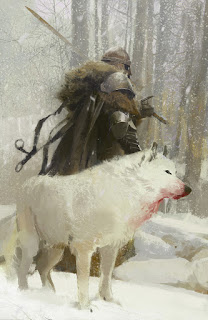“The more you try, the more you learn.”
Grettir the Strong utters this counsel to his son after assigning him
an unfamiliar task on the family farmstead.
Grettir’s son initially balks at the new task as he has never
performed it before, hence this advice.
Iterations of this advice also show up in various sagas in respect to not
only new tasks but to those who assume they “know” something because they have
read of it or seen said task performed.
We should all never lose sight of the fact that simply knowing of a
thing and seeing a thing done conveys any sense of the experience of the thing
read about or observed.
Knowledge is in the doing.
Grettir’s son wants to put off the task until he knows more about it.
How many of us are like-minded with Grettir’s son?
How many of us are world-champion readers up on this or that subject,
master-class competitors in “Likes” and “Shares” that indicate what we may “like”
to do ourselves but may in fact not be doing at all because of our extensive “Liking”
prep time.
[Let us not forget that the word “Share” has been perverted where it
no longer means offering something of yourself, of your own creation, but rather
“Sharing” the thoughts, creations, experiences of others. To truly “Share” requires
something of the self, something of you.]
We may have the desire to learn to swim, we may read every book on the
subject, we may belong to dozens of “Swimming” Facebook pages, we may have
viewed 987 YouTube videos on swimming technique, we may dress like Michael Phelps
in the off-season, but in the words of former President of the Hell’s Angels,
Sonny Barger: “To get wet you have to
get in the swimming pool.”
The more experiences we wet ourselves in, not merely read, view, “Like”
and “Share” the more we do, the more we will know.
„Megum við
allir synda vel, synda oft og synda í mörgum vatni. Leyfi þurru landi, þurr
lifir til áhorfenda til lífsins.“
“May we all swim well, swim
often, and swim in many waters. Leave the dry land, the dry lives to the spectators
to life.”



Comments
Post a Comment